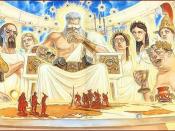In Archibald MacLeish's novel J.B., Macleish attempts to tackle the theodicy question by, more or less, mirroring the story of Job from the bible. But does this really get the point across? Bad things happen to good people because, in the end, we are all sinners to begin with, so we, as humans, should accept that fact that we are at Gods will and that if were to be punished, then as humans, we have that coming. But why? and is Macleish presenting an almost derogatory manner in which humans are addressed by God? Or is God even half as powerful as is believed?
J.B. opens with Mr. Zuss and Nickles playing their parts as God and Satan. They are in the process of making a deal on how a good, moral, Christian man would react to everything he loved being taken away; his children, his wife, his house, even his looks.
J.B., the character mirroring Job, is "a perfect and upright man," which is why they pick him for their game. To think that this would go on makes God automatically not at all omniscient, but apparently all powerful to have the ability to take all this away from J.B. But even in the book of Job it states that "His eyes are upon the ways of a man, and He sees all his steps," so is it really necessary to even have this display of power if God knows what's going to happen? Another display of this apparent omniscient is after J.B. has his "revelation" that he cannot do anything but trust in Gods ways for taking everything from him, Mr. Zuss and Nickles are discussing the events, and nickels states to Mr. Zuss that he was right and Mr. Zuss replies "of course...


